Table of Contents
- Quick List of the Top 5 Gimbal for Sony A7iii
- Comparison Table of the Top Gimbal for Sony A7iii
- Top 5 Gimbal For Sony A7iii to Capture Professional Shots
- 1. DJI RSC-2
- Pros of Using DJI RSC-2
- Cons of Using DJI RSC-2
- 2. DJI RS 4 Mini
- Pros of Using DJI RS 4 Mini
- Cons of Using DJI RS 4 Mini
- 3. Zhiyun Weebill 3S
- Pros of Using Zhiyun Weebill 3S
- Cons of Using Zhiyun Weebill 3S
- 4. DJI RS 4 Pro
- Pros of Using DJI RS 4 Pro
- Cons of Using DJI RS 4 Pro
- 5. Zhiyun Crane 4E
- Pros of Using Zhiyun Crane 4E
- Cons of Using Zhiyun Crane 4E
- Things to Consider Before Buying the Best Gimbal for Sony A7iii
- Payload Capacity
- Battery Life
- Weight and Portability
- Quick Setup and Balance Adjustments
- Multiple Shooting Modes
- Final Words
I remember the first time I shot with the Sony A7iii. Initially, everything looked perfect until I reviewed the footage. Shaky frames, uneven pans, and all that effort gone.
That’s when I realized the camera wasn’t the problem. It was my setup. A gimbal can fix that, but picking the right one isn’t simple. Between payload specs, battery life, and fancy features, it’s easy to get lost in the options.
So, in this guide, I’ll walk you through the best gimbal for Sony A7iii. You’ll see what makes each one stand out, and how to choose the setup to improve your shoots.
Quick List of the Top 5 Gimbal for Sony A7iii
Here’s a quick guide to help you find the best match.
1. DJI RSC-2: Best for compact, foldable design and extended shooting sessions with 6.6 lbs payload capacity.
2. DJI RS 4 Mini: Ideal for lightweight builds and impressive battery life with a 4.4 lbs payload capacity.
3. Zhiyun Weebill 3S: Good for budget-friendly gimbal with excellent 6.6 lbs payload and portability.
4. DJI RS 4 Pro: Best for heavy setups having a 10 lbs payload and professional filmmakers needing extra stability.
5. Zhiyun Crane 4E: Ideal for creative flexibility with multiple shooting modes and easy handling with a 7.2 lbs payload.
Comparison Table of the Top Gimbal for Sony A7iii
Here’s a compact comparison to help you quickly understand what each gimbal offers for the Sony A7iii —
| Gimbal Model | Payload Capacity | Weight | Battery Life |
| DJI RSC-2 | 6.6 lbs (3.0 kg) | 2.6 lbs (foldable) (1.18 kg) | Up to 14 hours |
| DJI RS 4 Mini | 4.4 lbs (2.0 kg) | 2 lbs (0.89 kg) | Up to 13 hours |
| Zhiyun Weebill 3S | 6.6 lbs (3.0 kg) | 2.2 lbs (1.0 kg) | Up to 11.5 hours |
| DJI RS 4 Pro | 10 lbs (4.5 kg) | 3.5 lbs (1.6 kg) | 12 hours |
| Zhiyun Crane 4E | 7.2 lbs (3.27 kg) | 3.5 lbs (1.6 kg) | 12 hours |
Top 5 Gimbal For Sony A7iii to Capture Professional Shots
Heads up, here, you won’t find the best gimbal for Sony A7iii under $150. But indeed, you’ll get the best options for your Sony A7iii that can handle weight and come with abundant features to make your shots steady and professional.
1. DJI RSC-2
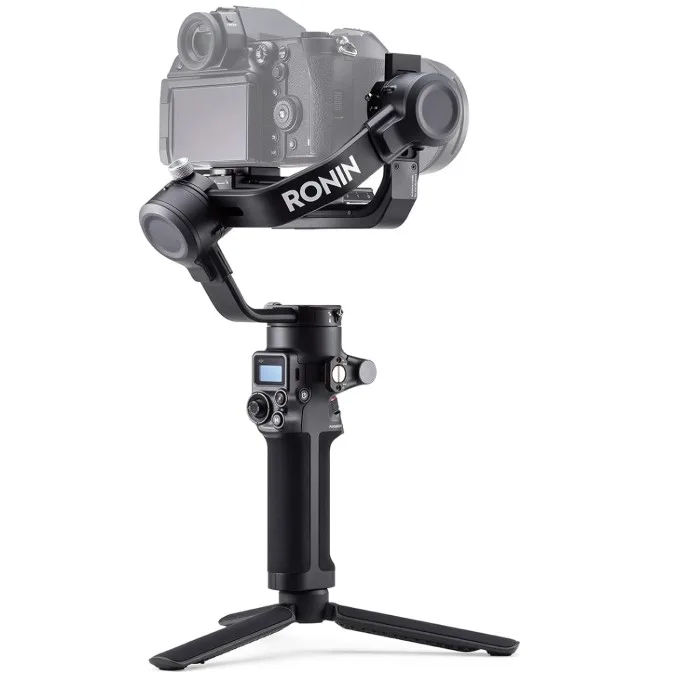
- Payload Capacity: 6.6 lbs
- Battery Life: Up to 14 hours
- Weight: 2.6 lbs (foldable)
- Price: $248.99 (Amazon)
While I was doing reviews gimbal for Sony A7iii, the DJI RSC-2 grabbed my attention. Here are the reasons!
I’ve worked with it on heavy lens setups, like the Tamron 70-300. Now, the DJI RSC-2 comes with a 3kg payload. So, you can mount more than just a lightweight prime and still get reliable stabilization.
What I like most is how compact it gets. Folded down, it’s small enough to throw in a backpack. Yet the battery will keep going for up to 14 hours. Meanwhile, the 1-inch OLED screen and joystick give you quick control of the handle.
The build feels solid in hand! Balancing does take a little practice, but once you’ve done it a couple of times, it’s straightforward. Plus, the dual quick release plates save time if you’re switching between cameras or swapping accessories.
Now, one heads-up: if you rely on a flip-out screen, the gimbal arms can get in the way. Also, the app asks for more permissions than some people are comfortable with.
Pros of Using DJI RSC-2
- Compact foldable design for easy storage and travel.
- Strong payload supports Sony A7iii with heavy lenses.
- Long battery life enables all-day professional shooting.
- Quick-release system simplifies camera swaps on set.
- OLED screen helps monitoring without constant phone use.
Cons of Using DJI RSC-2
- Can feel heavy during long handheld sessions.
- App demands extensive user data and permissions.
2. DJI RS 4 Mini
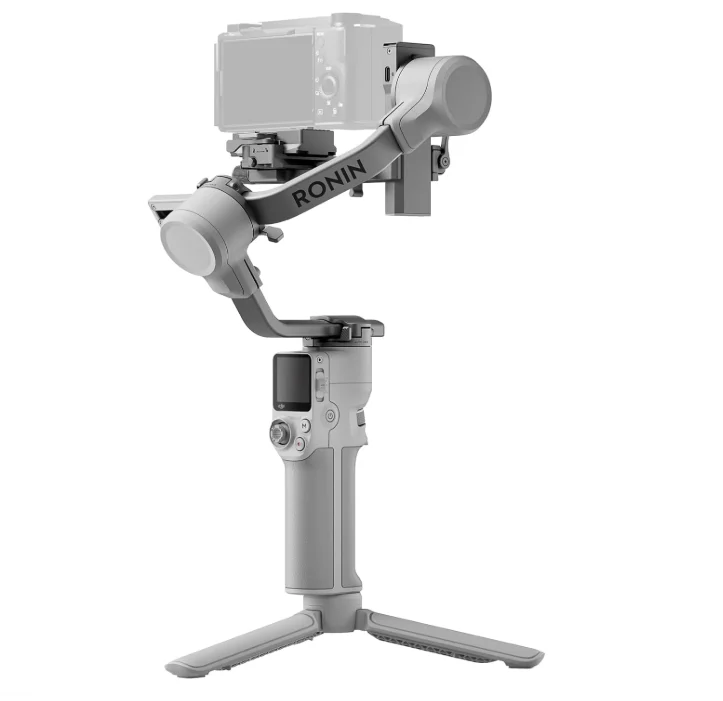
- Payload Capacity: 4.4 lbs
- Battery Life: Up to 13 hours
- Weight: 2 lbs
- Current Price: $309 (Amazon)
When it comes to the new gimbal for Sony A7iii, the DJI RS 4 Mini is a game-changer. It solves some common gimbal headaches, especially around portability and smooth footage.
With its 4.4 lbs payload capacity, it handles the A7iii effortlessly, even with heavier lenses like the 24-70mm. Plus, the 13-hour battery life means you won’t need to worry about recharging every few hours.
Also, its lightweight (under 2 lbs) design makes it easy to carry all day. In addition, the RS 4 Mini comes with an OLED touchscreen to let you adjust settings without frustration.
Balancing it is also a quick process, especially with the fine-tuning knob and auto-lock feature. That said, the RS 4 Mini does have its limits. If you’re planning to use it with a larger, more complex setup, it might struggle with heavier rigs. In those cases, the RS 4 Pro might be a better fit.
Pros of Using DJI RS 4 Mini
- Supports full-frame mirrorless cameras like Sony A7iii.
- Impressive 13-hour battery life for extended shoots.
- Quick auto-locking for effortless setup and storage.
- Optional AI tracking module ideal for solo shooters.
- Vertical shooting mode for social media content.
- Fast charging in less than 2 hours for convenience.
Cons of Using DJI RS 4 Mini
- No removable battery, limiting extended use.
- AI tracking module sold separately, adding extra cost.
3. Zhiyun Weebill 3S
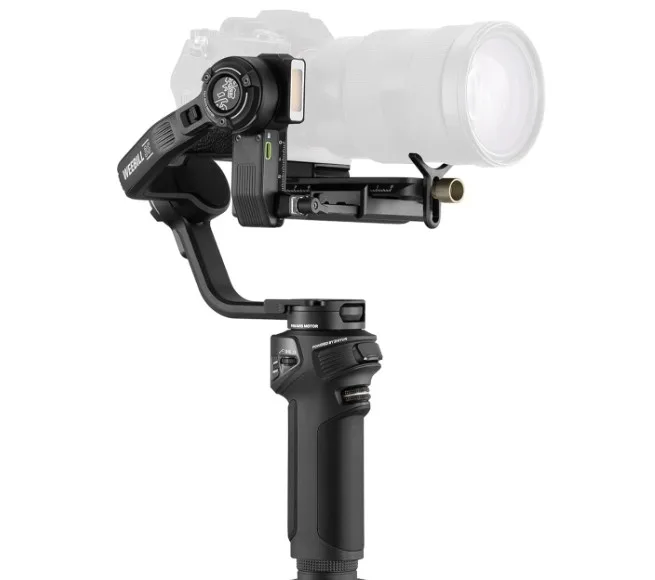
- Payload Capacity: 6.6 lbs
- Battery Life: 11.5 hours
- Weight: 2.2 lbs
- Current Price: $319 (Amazon), $287 (Official)
The Zhiyun Weebill 3S is one of the best budget gimbal for Sony A7iii. Thanks to its 3-axis stabilization, you can expect optimized shots even with heavier lenses like the Tamron 28-75mm G2. Plus, the compact design and comfortable grip are real game-changers.
The battery life is solid, lasting up to 11.5 hours, so that you won’t be constantly reaching for a charger. Plus, with its fast 2-hour PD charging, you can quickly get back to shooting.
On top of that, if you’re working in low light, the built-in 1000 lux LED fill light comes in handy. One of the standout features is the Sling Mode 2.5 and the extendable grip. They open up a ton of creative possibilities, like low-angle shots or more stable two-handed operation.
One downside, though, is the gimbal’s shorter arm length. This can make it tricky to balance larger lens setups, especially with heavier rigs. But for your Sony A7iii, it’s still an excellent choice.
Pros of Using Zhiyun Weebill 3S
- Compact design makes it travel-friendly and portable.
- Supports both landscape and portrait orientations.
- Fast PD charging for quick turnaround.
- Sling grip offers better control and stability.
- Quick release plate saves time during setup and teardown.
- Built-in LED light and noise-canceling mic for added versatility.
Cons of Using Zhiyun Weebill 3S
- Motor strength may struggle with larger lenses or rigs.
- No automatic balancing feature for quick setups.
- Initial setup and balancing can be time-consuming.
4. DJI RS 4 Pro
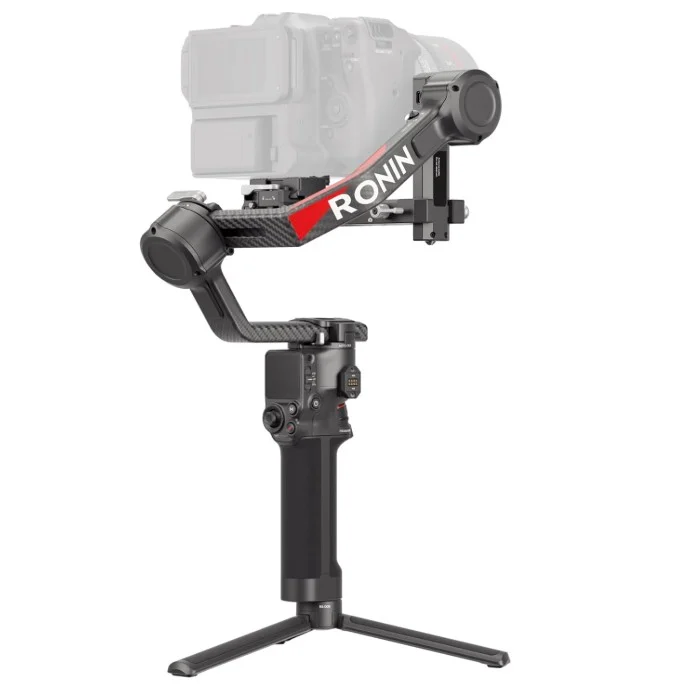
- Payload Capacity: 10 lbs
- Battery Life: 12 hours
- Weight: 3.5 lbs
- Current Price: $869 (Amazon, Official)
If you’re looking to target gimbal for Sony A7iii, the DJI RS 4 Pro offers unparalleled stability and control. With a solid 4.5 kg payload capacity, it handles heavier lenses, like the 70-200 GM LENS, with ease.
The battery life is impressive, 12 hours on a full charge. At just 1.9 kg, it’s light enough to carry around for extended periods. Plus, setting up is a breeze, with adjustable motors that help you balance the camera quickly.
Whether you’re shooting in landscape or portrait mode, the RS 4 Pro holds steady. However, if you frequently switch between orientations, the lack of a quick-switch feature can slow things down.
And one more thing, the price is on the expensive side. So, you’re just starting out, and it might feel heavy on your pocket. That said, the DJI RS 4 Pro is a solid choice for stabilization, excellent control, and easy setup.
Pros of Using DJI RS 4 Pro
- Improved motor strength for better stability.
- Easy Bluetooth control for wireless gimbal operation.
- Supports a variety of lenses, including anamorphic.
- Advanced auto-lock system for easy setup.
- Improved focus control with Focus Pro motor.
Cons of Using DJI RS 4 Pro
- Requires manual rebalancing when switching orientations.
- Expensive compared to other gimbals in the market.
- Learning curve for new users, especially in setup.
5. Zhiyun Crane 4E
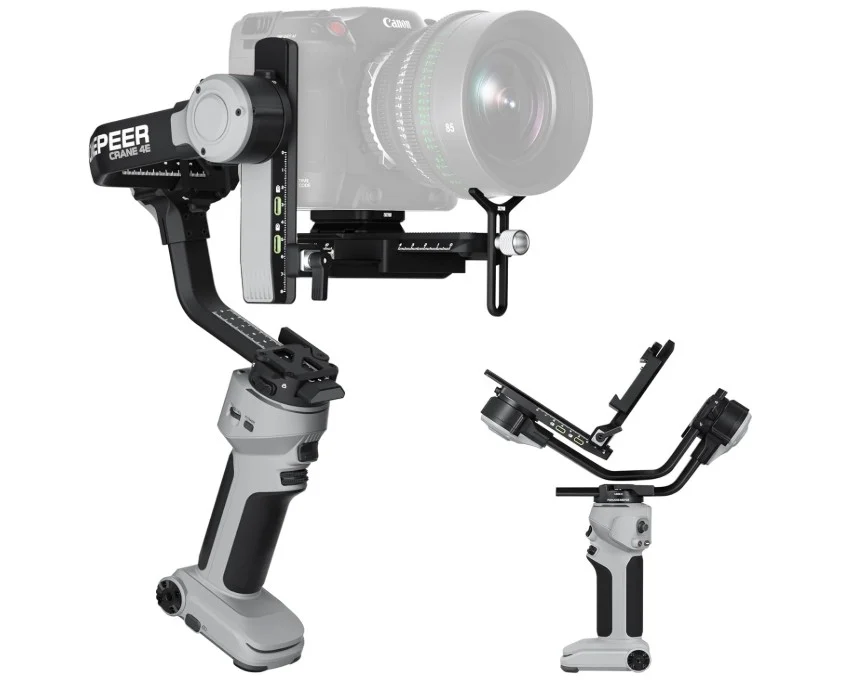
- Payload Capacity: 7.2 lbs
- Battery Life: 12 hours
- Weight: 3.5 lbs
- Current Price: $399 (Amazon, Official)
If you’re shooting with the Sony A7III, you know how important it is to have a gimbal that keeps things stable. The Zhiyun Crane 4E does just that!
Using the Crane 4E is a breeze thanks to its responsive joystick and customizable control wheel. Plus, you can quickly switch between horizontal and vertical shooting modes. With its 6 kg payload capacity, the Crane 4E easily supports the A7III along with heavier lenses or accessories.
Also, the 12-hour battery life means you can go through a full day. At just 1.63 kg, it’s light enough for comfortable use during long sessions, so you won’t feel weighed down even after hours of filming.
On the downside, it lacks balance indicator lights, which might make fine-tuning a bit more time-consuming. However, the Crane 4E’s solid performance, excellent build, and simplicity make it a great match for Sony A7III users.
Pros of Using Zhiyun Crane 4E
- Quick 2-hour charge for up to 12 hours of use.
- Lightweight design improves portability.
- Multiple shooting modes for creative flexibility.
- Ergonomic grip and customizable controls for ease of use.
- Bluetooth shutter for easy camera control.
Cons of Using Zhiyun Crane 4E
- Lacks a carrying case, adding extra storage cost.
- No balancing indicator lights for beginners.
- Learning curve for first-time gimbal users.
Read Related Article:
Things to Consider Before Buying the Best Gimbal for Sony A7iii
Here are the top features you should pay attention to when picking a gimbal for your Sony A7iii —
Payload Capacity
Make sure the gimbal can handle the combined weight of your Sony A7iii and any lenses or accessories you plan to use. A gimbal with a 3 to 7 kg payload capacity is a solid choice for this, as it ensures that even heavier lens setups will remain stable without straining the motors.
Battery Life
You’ll want a gimbal with long battery life, ideally 12 hours or more. It allows you to film all day without constantly having to recharge. And that’s especially helpful when you’re on a tight schedule or working in remote locations.
Weight and Portability
Choose a gimbal that’s lightweight enough to use comfortably for long periods. If it’s too heavy, it can lead to arm fatigue, especially on long shoots. In the meantime, a foldable design or something compact is always a plus so that you can store and carry it easily.
Quick Setup and Balance Adjustments
Look for a gimbal with a simple balancing system or a quick-release plate. It’ll help save time when setting up and make sure you can jump into shooting without unnecessary delays.
Multiple Shooting Modes
Go for a gimbal that supports multiple shooting modes, like portrait, landscape, or modes designed for smooth tracking. These modes add versatility to your shooting style to help you get creative with your shots.
Final Words
So, what’s the real deal when looking for the best gimbal for Sony A7iii? I’ve tested enough to know that it all comes down to balance, power, and how long you can shoot before your arms give out.
The DJI RS 4 Mini keeps things light and quick. Meanwhile, the Weebill 3S adds comfort and creative control. In contrast, the RS 4 Pro is built for those who want total command on set.
That said, match the payload to your lens setup, and you’re good to go.
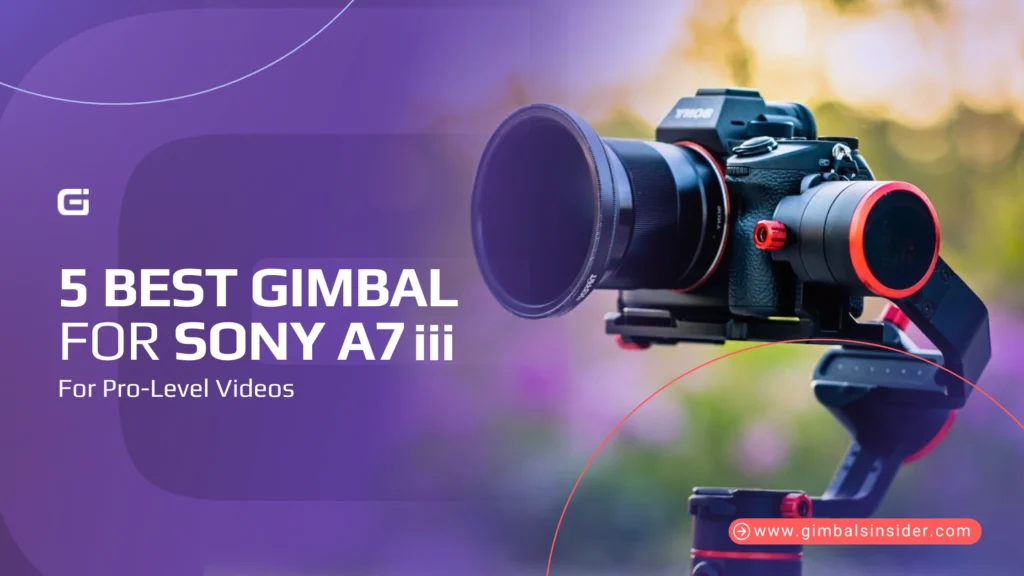


Leave A Reply
Comment submitted successfully!